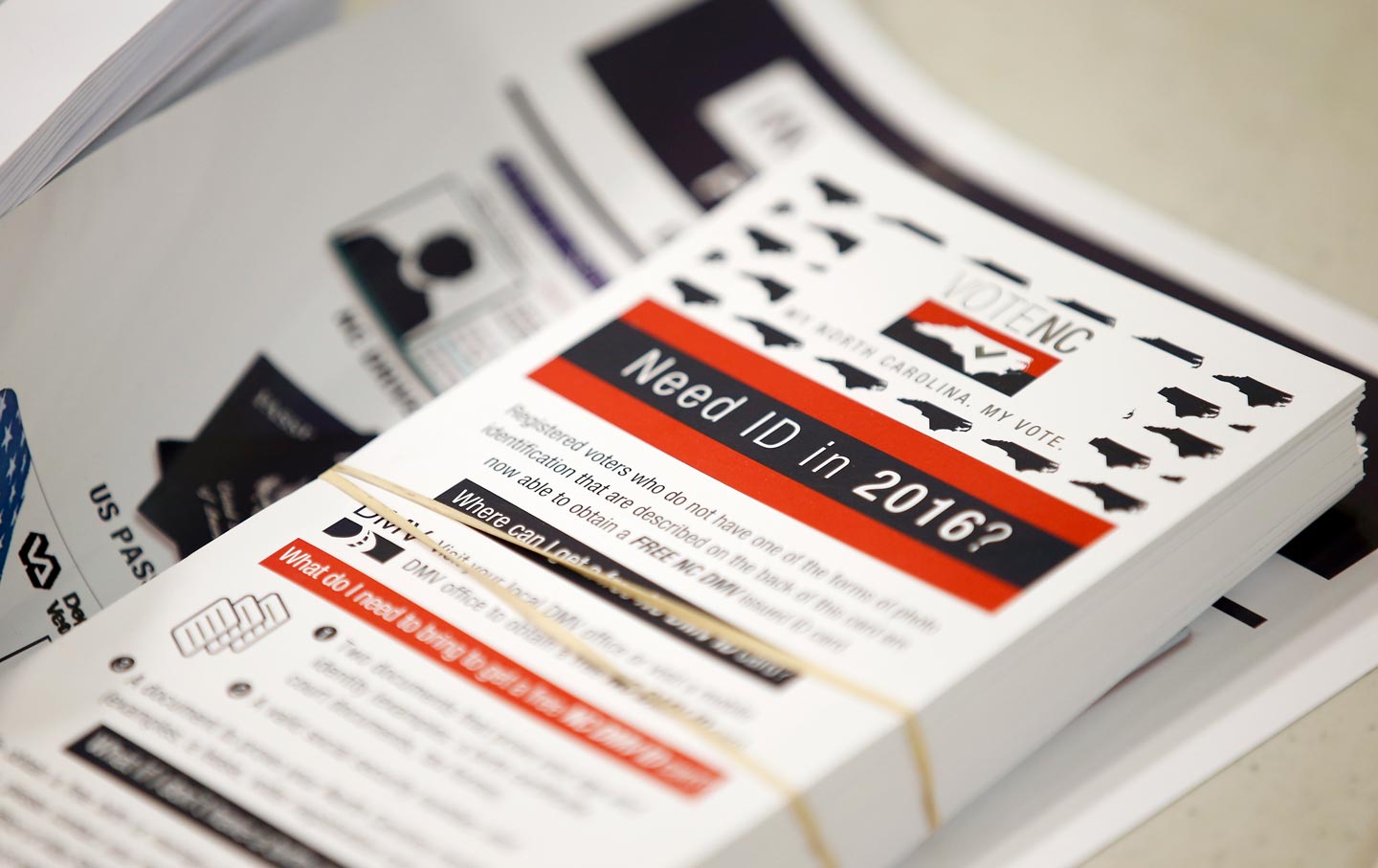North Carolina has spent $5 million and counting defending the country’s worst voting restrictions, which the US Court of Appeals for the Fourth Circuit said targeted black voters with “almost surgical precision.” The state waited 17 days after that ruling, then asked the Supreme Court yesterday to reinstate its voter-ID law, cuts to early voting and ban on pre-registration for 16 and 17-year-olds. Governor Pat McCrory hired Paul Clement, the former solicitor general in the Bush administration who argued against Obamacare and for the Defense of Marriage Act before the Supreme Court, to represent the state.
Republicans in North Carolina are pulling out all the stops to suppress the state’s reliably Democratic black vote. After the Fourth Circuit court reinstated a week of early voting, GOP-controlled county elections boards are now trying to cut early voting hours across the state. By virtue of holding the Governor’s office, Republicans control a majority of votes on all county election boards and yesterday they voted to cut 238 hours of early voting in Charlotte’s Mecklenburg County, the largest in the state. “I’m not a big fan of early voting,” said GOP board chair Mary Potter Summa, brazenly disregarding the federal appeals court’s opinion. “The more [early voting] sites we have, the more opportunities exist for violations.”
Republicans are very cognizant of the fact that Barack Obama carried Mecklenburg County by 22 points in 2012 and that 70 percent of African-Americans used early voting in the county during the last presidential election versus 48 percent of white voters.
There’s no evidence early voting increases the likelihood of voter fraud, but cutting early voting does lead to longer lines at the polls, like we saw in Florida 2012—when that state cut early voting from 14 to 8 days and there were 7-hour lines in cities like Miami, deterring 201,000 people from voting.
Mecklenburg isn’t the only county where this is happening. Republicans in Watauga County, home to Appalachian State University, refused to approve a voting site on ASU’s campus–where 15,139 votes took advantage of 215 hours of early voting in 2012–and will have only one early voting site for the county—in the “tiny office on the first floor of the County Courthouse,” writes local blogger Jerry Williamson.
Aside from the fact that Republicans are needlessly burdening the right to vote, the fight over access to the ballot matters because North Carolina might be the most competitive state in the country this year, with close races for president, governor, US senate, attorney general, and many other down-ballot contests.
This isn’t the only kind of suppression occurring in North Carolina. Last week, the federal courts struck down the state’s legislative maps as an unconstitutional racial gerrymander, finding that Republicans used “race as a predominant factor” to marginalize black voters. (I write much more about this in a 2012 Nation story “How the GOP Is Resegregating the South.”)
North Carolina and Texas are the only states where federal courts have overturned new voting restrictions and redistricting maps since 2010 for discriminating against minority voters. When the courts repeatedly tell you to stop discriminating, maybe it’s time to find a new political strategy.
Original Article
Source: thenation.com/
Author: Ari Berman
Republicans in North Carolina are pulling out all the stops to suppress the state’s reliably Democratic black vote. After the Fourth Circuit court reinstated a week of early voting, GOP-controlled county elections boards are now trying to cut early voting hours across the state. By virtue of holding the Governor’s office, Republicans control a majority of votes on all county election boards and yesterday they voted to cut 238 hours of early voting in Charlotte’s Mecklenburg County, the largest in the state. “I’m not a big fan of early voting,” said GOP board chair Mary Potter Summa, brazenly disregarding the federal appeals court’s opinion. “The more [early voting] sites we have, the more opportunities exist for violations.”
Republicans are very cognizant of the fact that Barack Obama carried Mecklenburg County by 22 points in 2012 and that 70 percent of African-Americans used early voting in the county during the last presidential election versus 48 percent of white voters.
There’s no evidence early voting increases the likelihood of voter fraud, but cutting early voting does lead to longer lines at the polls, like we saw in Florida 2012—when that state cut early voting from 14 to 8 days and there were 7-hour lines in cities like Miami, deterring 201,000 people from voting.
Mecklenburg isn’t the only county where this is happening. Republicans in Watauga County, home to Appalachian State University, refused to approve a voting site on ASU’s campus–where 15,139 votes took advantage of 215 hours of early voting in 2012–and will have only one early voting site for the county—in the “tiny office on the first floor of the County Courthouse,” writes local blogger Jerry Williamson.
Aside from the fact that Republicans are needlessly burdening the right to vote, the fight over access to the ballot matters because North Carolina might be the most competitive state in the country this year, with close races for president, governor, US senate, attorney general, and many other down-ballot contests.
This isn’t the only kind of suppression occurring in North Carolina. Last week, the federal courts struck down the state’s legislative maps as an unconstitutional racial gerrymander, finding that Republicans used “race as a predominant factor” to marginalize black voters. (I write much more about this in a 2012 Nation story “How the GOP Is Resegregating the South.”)
North Carolina and Texas are the only states where federal courts have overturned new voting restrictions and redistricting maps since 2010 for discriminating against minority voters. When the courts repeatedly tell you to stop discriminating, maybe it’s time to find a new political strategy.
Original Article
Source: thenation.com/
Author: Ari Berman

No comments:
Post a Comment